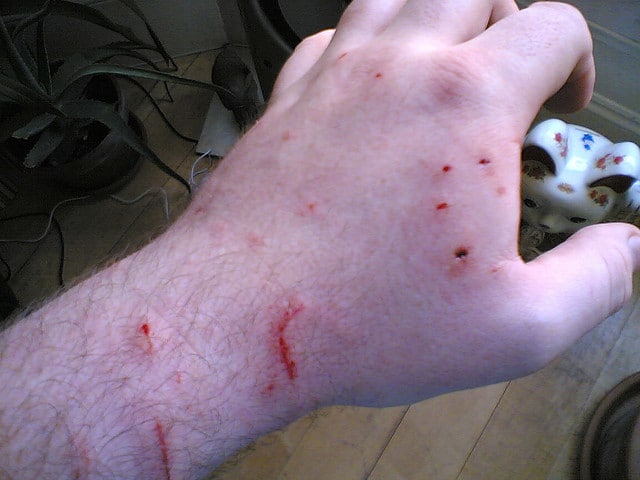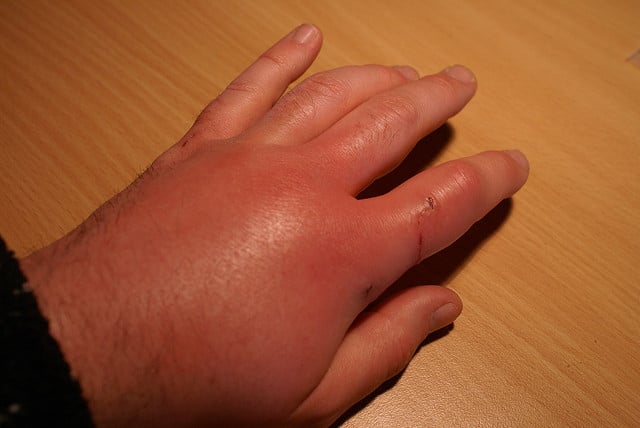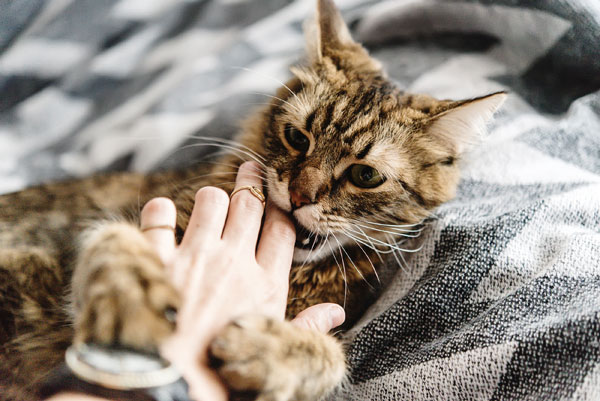I had never been bitten by a cat before I started volunteering at a cat shelter this previous summer. I’d been nipped at, sure, but never to the point of broken skin. However, none of the cats who bit me meant to do me harm — which is an important thing to remember in my position of continuing to care for them, even with fresh wounds. All those cat bites were from kitties who had simply gotten overstimulated. They’re living in an environment with the ever-changing sounds and smells of 130 other cats, so it’s easy to see how cat bites happen.
My experience with cat bites

The first cat to bite me was Miles, an enormous black beauty who had been caged for health issues. While cleaning his cage, he was rubbing against my hands and headbutting my elbows. He was new to my area of the shelter, and I was excited to have some good bonding time with him. Then, behind me, there was a scuffle between two free-roaming cats. I turned my head to see what all the fuss was about, and Miles bit me on the back of my neck. This bite was mild; he barely broke the surface of my skin. It was more of a deep scrape, really. Still, it startled me, and, of course, OUCH!
When Miles bit me, I didn’t know anything about cat bites. And because that cat bite didn’t get infected, I stayed oblivious about cat bites for a while. Then, about a week later, Rigel bit me. I was scratching him on his sweet orange-spotted head, behind his ears. He was loving it, loving it, loving it, until he didn’t love it anymore and sunk his teeth into my hand like a snake would.
One tooth went into the palm side of my hand, at the base of my thumb, and another tooth punctured a similar spot on the other side of my thumb. I knew it was bad the second it happened, as pain shot up my arm and made my hand throb.
My instinct with the cat bite was to wash it, smear it with an antibiotic ointment, and bandage it up.
When cat bites get infected

I wasn’t concerned about the cat bite until the next day when I removed the bandage. What I found was that the base of my thumb was a bit swollen (nothing too dramatic, but certainly noticeable), the area was pink, warm to the touch, and painful. As a freelancer who often struggles to eat, let alone see a doctor, I don’t have health insurance (I play emergency roulette every time I leave my apartment). I kept the punctures clean and smeared with a triple-antibiotic ointment, and I changed the bandages twice per day — keeping a close eye on the brewing cat bite infection to make sure it didn’t get worse.
After a few days, the swelling went down, the redness receded and the area became less tender. I was lucky.
Treatment for cat bites — how to prevent cat bite infections
“Because cat bites carry the risk of infection, they shouldn’t be taken lightly,” Dawn Quinn, a registered nurse, advises. “You can lessen your chances of developing an infection by washing your wound with antibacterial soap thoroughly and immediately. If you have peroxide or Betadine on hand, you may use either to disinfect your wound.”
Quinn says that deep-puncture wounds from cat bites might bleed and that you should apply pressure to stop the bleeding, then apply a clean bandage. She also recommends visiting urgent care or an emergency room.
“A course of oral antibiotics is almost always prescribed in the case of deep-puncture wounds,” she says. “Depending on the circumstances of your bite, you may need to think about rabies or tetanus infection, and a health-care provider can help you evaluate your level of risk.”
What to know about cat bites and infections
“Cat bites are highly infectious,” says Quinn. “The deeper the bite, the greater the chances are that it can become infected.”
Cat bites are exceptionally dangerous and prone to infection because a cat’s needle-like teeth can push bacteria deep into flesh, tendons and joints. The small but deep puncture wounds are hard to thoroughly clean and tend to trap bacteria inside, where it quickly spreads.
Signs of infection from cat bites
According to Quinn, cat bites that are infected will be red and painful and might have some drainage. You might see bumps or blisters. Late stages of infections from cat bites might result in fever, weakness, swollen lymph nodes, headache and a general feeling of being unwell.
What are the signals that a cat might bite?

It’s not uncommon for cats to get overstimulated during play and lash out from excitement (though it is rarer for a family cat to lash out in a way that breaks skin). In nonplayful situations, though, there are some signals you should heed.
According to Hannah Curtain, a certified veterinary technician, “The biggest red flags are the vocal signals, such as yowling or hissing. Always watch for signs of fright and offensive or defensive behavior when handling a cat. A cat in danger mode will probably be crouched with his ears and whiskers pinned back, tail down, dilated pupils; he might be growling or yowling as a warning to stay away.”

Why do cats bite?
Remember that cats don’t inflict injury based on whether or not they “like” the person they injure and their behavior shouldn’t be taken personally. When it comes to cat bites, they’re simply acting in self-preservation, striking if they feel threatened.
Curtain advises that “people who handle animals should approach them in a calm, confident manner, but they should be prepared to back off if the situation is too stressful for themselves or the animal. Animals can sense when a handler’s energy is off and can interpret this as a threat. Just like people, animals sometimes just need a break to cool down and then the situation can be approached again.”
Thumbnail: Photography by Bogdan Sonjachnyj / Shutterstock.
Read more about cat health and care on Catster.com:









